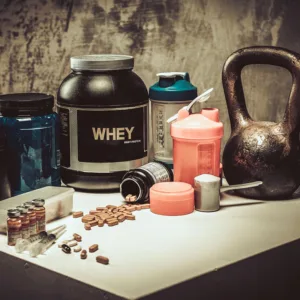Branched-chain amino acids (BCAAs) are like tiny nutritional workhorses, playing a crucial role in muscle growth, recovery, and overall health. But what exactly are they, and why should you care? Branched-chain amino acids (BCAA) supplementation is popular for intra-workout energy, enhancing recovery, and more. But when is the best?
Branched-chain amino acids or BCAA for short, consist of three essential amino acids: leucine, isoleucine, and valine. The body does not make BCAAs (hence why they’re essential), and so we have to get them from foods that contain protein. But many people take these nutrients in supplement form too because there are supposed benefits to doing so. BCAAs have been shown to have positive effects on recovery, fatigue, soreness, protein synthesis, muscle maintenance, and performance, in several studies.
But the question a lot of people have is whether it’s best to take BCAAs before or after workouts. Well, we’re going to give you our best answer. This article will delve into the fascinating world of BCAAs, exploring their benefits, sources, and potential drawbacks.
The Big Three: Leucine, Isoleucine, and Valine
BCAAs are a trio of essential amino acids: leucine, isoleucine, and valine. Unlike other amino acids your body can manufacture, BCAAs must be obtained through diet or supplementation. They make up about 35% of the essential amino acids found in muscle protein, giving them a starring role in muscle building and repair.
BCAAs: Beyond Muscle
While muscle growth is often the first thing that comes to mind with BCAAs, their benefits extend far beyond the gym. Here are some key ways BCAAs can impact your health:
- Enhanced Exercise Performance: BCAAs can reduce fatigue and improve exercise endurance, allowing you to train harder and longer.
- Reduced Muscle Soreness: BCAAs may help decrease muscle soreness and promote faster recovery after exercise.
- Improved Blood Sugar Control: BCAAs can help regulate blood sugar levels, potentially benefiting individuals with diabetes or prediabetes.
- Increased Fat Burning: Some studies suggest BCAAs may promote fat burning and support weight management efforts.
- Enhanced Brain Function: BCAAs play a role in neurotransmitter production, potentially improving cognitive function and reducing fatigue.
Fueling Up on BCAAs: Food or Supplements?
The good news is, you can get a healthy dose of BCAAs from a variety of food sources. Animal protein is particularly rich in BCAAs, with meats, poultry, fish, eggs, and dairy products leading the pack. Plant-based options like beans, lentils, and nuts also contain BCAAs, although in smaller amounts.
For athletes or individuals with high protein needs, BCAA supplements can be a convenient way to boost their intake. However, it’s crucial to remember that food should always be the primary source of nutrients. Supplementation should only be considered after consulting a healthcare professional.
The BCAA Balancing Act
While BCAAs offer a range of health benefits, moderation is key. Excessive BCAA intake, particularly through supplements, may disrupt the balance of other amino acids and potentially lead to negative side effects like nausea, diarrhea, and fatigue. It’s important to stick to recommended dosages and prioritize whole food sources of BCAAs whenever possible.
Unraveling the BCAA Mystery
Research on BCAAs is ongoing, with new studies constantly emerging. While some findings are promising, others show less conclusive results. The bottom line? BCAAs can be a valuable addition to a healthy diet and exercise routine, but they’re not a magic bullet. A balanced approach that prioritizes whole foods, regular physical activity, and adequate sleep is essential for optimal health and well-being.

 What Are Supplement BCAAs?
What Are Supplement BCAAs?
BCAAs come in different forms including caps, powders, and liquids which are the most common. Most products deliver 5-7 grams of BCAAs per serving and may also contain other ingredients that could be beneficial for performance, recovery, and overall health. But you definitely want to choose quality supplements from reputable companies to ensure you’re getting effective ingredients.
You’ll also see a 2:1:1 ratio for many of the products. This refers to the amount of each BCAA (leucine, valine, and isoleucine) and is generally considered an effective ratio of BCAAs for the proposed benefits. Although, because leucine is the more important BCAA for increasing muscle protein synthesis, you may see higher ratios of leucine (e.g., 4:1:1) to the other two nutrients (1).
Studies on BCAA Intake
If you’re going to take BCAAs, then it makes sense to do so around the times that you’re engaging in physical activity. There’s not a whole lot of research/studies that compare the effects of BCAA intake before and after exercise, but let’s look at two.
Study #1 – pre-exercise BCAA intake shows advantages
One study published by the Journal of Sports Medicine and Physical Fitness in 2017 compared the effects of BCAA intake pre and post eccentric exercise on delayed onset muscle soreness (DOMS) and exercise-induced muscle damage (EIMD). Researchers found that repeated BCAA intake before exercise had a more beneficial effect on both factors compared to a repeated intake after exercise (2).
For this study, “15 young men were given either BCAA (9.6 g·day-1) or placebo before and after exercise (and for 3 days prior to and following the exercise day) in three independent groups: the control group (placebo before and after exercise), the PRE group (BCAA before exercise and placebo after exercise), and the POST group (placebo before exercise and BCAA after exercise).”
They also each performed 30 reps of an eccentric exercise with their non-dominant arm.
Study #2 – BCAA intake pre and post-exercise elicit similar outcomes
A different study from 2017 wanted to test the anabolic window theory by comparing the effects of equal dose protein intake immediately before and post-exercise on muscle strength, hypertrophy, and body composition changes in resistance-trained men. The protein contained 5.5 grams of BCAAs per serving (3).
The study involved 21 men who were assigned to one of two groups. One group was instructed to take 25 g protein and 1 g carbohydrate immediately prior to exercise while the other consumed the same supplement post-exercise. Subjects engaged in three weekly resistance training sessions per week for ten weeks. They followed a total-body routine where they performed three sets of 8-12 repetitions for each exercise.
By the end of the study, researchers found similar improvements in strength, hypertrophy, and body composition between groups.
The study also found that the post-exercise anabolic window could effectively be several hours or more post-exercise depending on the timing of the pre-exercise meal. This was in contrast to the theory that you have a narrow window of opportunity to maximize the benefits of protein intake post-exercise. Other research is supportive of this as well (4).
So, Should You Take BCAAs Before or After Workouts?
Based on the research, it’s hard to say and there’s no definitive answer considering there aren’t a lot of studies comparing the two strategies. Therefore, to be safe, we’d recommend having BCAA both before and after your workout sessions.
Plus, you should be aiming to consume a sufficient amount of protein in your diet each and every day if you’re serious about your goals. “Protein contains lots of BCAAs and we all know that this macronutrient is essential for maximizing muscle growth, strength, and performance“. Not to mention, we need plenty to maintain our health and it can help with weight loss goals.
Also, be sure to use our Protein Calculator to determine your recommended daily intake.
But supplementing with BCAAs can certainly offer an advantage, especially for more active individuals who could benefit from loading up prior to and replenishing lost nutrients during and after activity. That’s right, BCAAs may also be beneficial during your workouts. In fact, many BCAA supplement labels suggest taking it during workouts as well to sustain performance.
Key takeaway: Take BCAAs before or after training for maximum benefit. You can even take it during your sessions. You can also take BCAAs both before and after training, but it’s also a good idea to get your BCAAs from food too around training times, especially from protein sources.
You can’t just take BCAAs without also getting enough of the other six essential amino acids found in animal and plant proteins or you get any results. BCAAs only make up three of nine essential amino acids.

 Does It Matter How Close To Your Training?
Does It Matter How Close To Your Training?
Based on the research previously mentioned, you probably don’t need to worry about missing your post-exercise anabolic window for BCAA intake. That’s because studies have shown that the anabolic window isn’t as narrow as previously thought. But you probably want to take it at least within 5 hours of training.
And the further your pre-exercise BCAA or protein intake is from your workouts, the sooner you may want to get nutrients into your system after training.
But if we’re talking about pre-exercise BCAA intake, in general, for maximizing its effects; you’re better off focusing on having balanced nutrition to fuel your activities and meeting your daily recommended protein intake.
How Many Grams of BCAAs Should I Take Daily?
OK, so now that you have a better idea about supplementing your BCAAs around exercise times, let’s talk about how many BCAAs (in supplement form) you should be taking every day.
Well, we’ll say one thing, you probably won’t have to worry about taking too much if you follow the label instructions on your BCAA supplement. But you should be getting plenty of BCAAs from protein-rich foods and to be honest, you’re more than likely to never be deficient if you’re eating enough complete sources of protein.
But, of course, supplements can give you an edge which is what they’re designed to do.
Now, how much can you take in a day and how much should you take? First, if you’re new to BCAA supplementation, always follow the label instructions for a safe and effective dosing recommendation.
Now, let’s look at the research.
According to the findings of one study, “1.2 g/kg/day of protein with 0.22 g/kg body mass/day of BCAA for eight days results in decreased perceptions of soreness in resistance-trained individuals with several years of experience” (5).
But it also determined that “BCAA supplementation in this fashion provides a minimal protective effect on attenuating other indirect makers of muscle damage following eccentric-based resistance exercise.”
In one analysis of 11 studies, researchers found that a minimum BCAA intake of 200 mg per kg of body weight (91 mg per pound) for longer than ten days can be effective for reducing exercise-induced muscle damage. However, this was true only if the extent of the muscle damage was low-to-moderate (6).
If you want to know how many grams of BCAAs this would mean you’d need to take for the same effect, we’ll first convert 91 mg into grams, which equals 0.091 grams. You’d then multiply 0.091 by your bodyweight. So for example, if you weigh 160 lbs/72kg, you’d multiply 0.091 by 160 lbs and you’d get 14.56 grams of BCAAs which would be your daily intake.
Key takeaway: If you’re eating plenty of protein-rich foods, taking your supplement as recommended should be sufficient. But if you want to potentially maximize the effects of BCAAs on exercise-induced muscle damage, then you should stick with the recommendation of multiplying 0.091 by your body weight to determine your ideal daily intake.
 Always Remember:
Always Remember:
- BCAAs are essential amino acids found in protein sources like meat, poultry, fish, eggs, dairy, beans, lentils, and nuts.
- They play a key role in muscle growth, recovery, and overall health.
- Potential benefits include improved exercise performance, reduced muscle soreness, better blood sugar control, increased fat burning, and enhanced brain function.
- Food should be the primary source of BCAAs, with supplements used only when needed and under professional guidance.
- Moderation is key, as excessive BCAA intake may lead to side effects.
So, the next time you reach for a protein-rich meal or consider a BCAA supplement, remember these little nutritional powerhouses and the potential benefits they offer for building muscle, boosting performance, and supporting overall health. Just like any aspect of nutrition, a balanced and informed approach is key to unlocking the full potential of BCAAs.
Wrapping Up
We hope that we answered your question about whether to take BCAAs before or after workouts. The answer has been and still is, before, during, or after exercise. However, you can take the studies and interpret it however you like but we also recommend you experiment a little too. You may notice that it works better for you at certain times or that it makes no difference.
But if you want to take BCAAs for the heck of it, then that’s also a good strategy.
More Products Review Contents
For More News And Daily Updates, Follow IFBNewsfeed.Org on Facebook, Twitter, and Instagram. Comment, Like, And Share With Everyone Who May Need To Be Updated With The Most Recent Fitness/Bodybuilding/Powerlifting And CrossFit News.
 Always Remember:
Always Remember:











